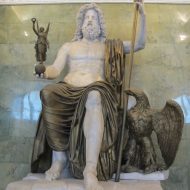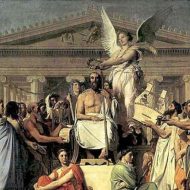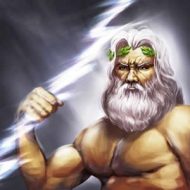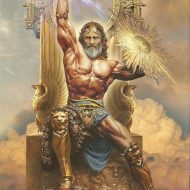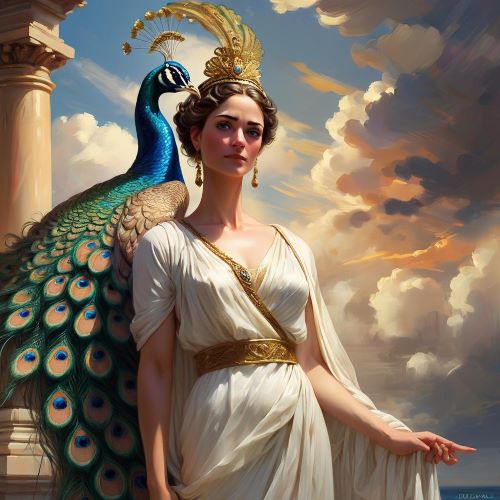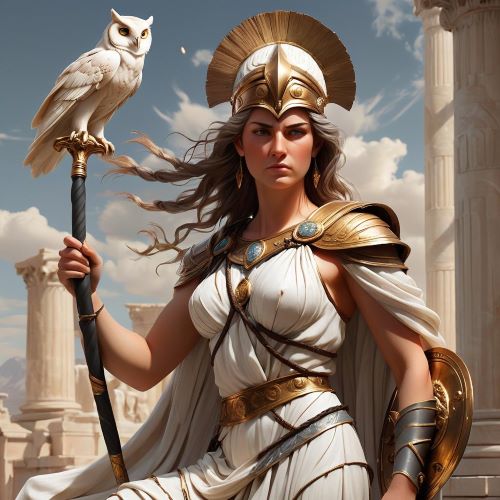Jupiter : The King of Gods
Listen
Jupiter
Introduction
Jupiter, alternatively called Jove, holds the esteemed position of the king of the gods in Roman mythology. As the god of the sky and thunder, he is symbolized by the eagle and the thunderbolt, drawing striking parallels with his Greek counterpart, Zeus. Towering over Mount Olympus, Jupiter commands unparalleled authority as the supreme deity. His imposing presence captures the imagination, as he reigns over both the celestial realms and the earth, marking him as a deity of profound significance.
Physical Traits
Jupiter is commonly represented as a dignified and mature figure, adorned with a beard and flowing hair. His eyes are described as radiant, mirroring the brilliance of the sky he governs. Typically depicted holding a thunderbolt, this emblem underscores his dominion over the heavens. Draped in majestic attire befitting his role as the divine ruler, Jupiter’s artistic portrayal often features a commanding presence, marked by a flowing beard and a resolute expression. The iconic imagery of him wielding a lightning bolt serves as a powerful symbol of his mastery over thunder and storms, solidifying his identity as a formidable force of nature.
Family
Jupiter, born to Saturn and Ops, ascended to divine supremacy by overthrowing his father and assuming the mantle of the ruler of the gods. His siblings include Neptune and Pluto, who govern the sea and the underworld, respectively. Juno, his sister, and wife, holds the esteemed title of queen of the gods. Together, they parented a host of offspring, among them Mars, Vulcan, Bellona, and Juventas.
This celestial family tree positions Jupiter at the forefront of the Olympian hierarchy, with each member presiding over distinct realms within the universe. His matrimonial union with Juno not only underscores their central roles in the divine narrative but also emphasizes the significance of familial bonds, even within the pantheon of gods.
Other names
Jupiter, also recognized by the poetic name Iuppiter, goes by several other appellations, including the well-known Jove. His epithet Jupiter Optimus Maximus, translating to the best and greatest, is a testament to his role as the preeminent king of the gods. While Jupiter is the widely acknowledged name for this deity, a variety of alternative titles illuminate different facets of his character and domain. In his capacity as the god of the sky and thunder, he is frequently addressed as Jove or Jove Optimus Maximus, underscoring his benevolent and supreme nature. Moreover, the Romans drew a parallel between Jupiter and the Greek god Zeus, emphasizing the cultural interchange between the two civilizations. These diverse names provide nuanced perspectives on Jupiter’s complex identity, revealing the profound depth of his influence.
Powers and Abilities
As the supreme ruler among the gods, Jupiter wields immense power that extends over the elements and beyond. His dominion over the weather allows him to conjure storms, rain, and lightning with the formidable might of his thunderbolt. Renowned not only for his control over nature but also for his role as the god of justice and law, Jupiter’s decisions hold ultimate authority, binding both gods and mortals.
The breadth of powers attributed to Jupiter mirrors the vast expanse of the sky he governs. His primary attributes include mastery over the elements, particularly the ability to command storms and unleash thunderous displays with a simple gesture, asserting his sovereign influence over the natural world. Furthermore, Jupiter is hailed as a guardian of the state, with his worship playing a pivotal role in the civic and military affairs of ancient Rome. The belief in his divine favor served to boost the morale of Roman soldiers, often attributing victories in battle to his intervention.
In addition to his martial prowess, Jupiter is recognized as a bestower of justice and morality. Serving as the embodiment of righteous governance, he upholds laws and ensures the binding nature of oaths and contracts. This facet of his character elevates him to the esteemed status of a moral authority, leaving an indelible impact on the ethical framework of Roman society.
Modern Day Influence
Jupiter’s impact extends into contemporary times, leaving an indelible mark on various facets of modern society. The fifth planet from the sun, a colossal celestial body in our solar system, bears his name owing to its massive size. The eagle, symbolic of power and authority and representing Jupiter, remains a common emblem in present-day iconography.
The Roman weekday ‘Iovis Dies,’ signifying Jupiter’s day, has evolved into Thursday in English and other languages, highlighting the enduring linguistic influence of this mythological figure. Beyond linguistics, Jupiter’s tales persist in popular culture, weaving through literature, art, and media, where his presence continues to shape creative expressions.
While the ancient Roman civilization has faded into history, the legacy of Jupiter perseveres, notably embodied in the massive planet named after the god. Jupiter, as a celestial entity, serves as a constant reminder of the deity’s enduring significance. Moreover, the thematic elements associated with Jupiter—embodying justice, authority, and benevolence—maintain a profound resonance in contemporary cultural and artistic expressions.
In literature, references to Jupiter abound, as writers draw inspiration from classical mythology to infuse their works with timeless themes. Likewise, the god’s image remains a popular subject in art, where contemporary artists frequently revisit and reinterpret the iconic representations of this formidable deity. In doing so, they contribute to the ongoing narrative of Jupiter’s influence, ensuring that the god’s presence remains vibrant and relevant in the ever-evolving tapestry of human expression.
Related Images
Frequently Asked Questions
What is lorem Ipsum?
I am text block. Click edit button to change this text. Lorem ipsum dolor sit amet, consectetur adipiscing elit. Ut elit tellus, luctus nec ullamcorper mattis, pulvinar dapibus leo.
What is lorem Ipsum?
I am text block. Click edit button to change this text. Lorem ipsum dolor sit amet, consectetur adipiscing elit. Ut elit tellus, luctus nec ullamcorper mattis, pulvinar dapibus leo.
What is lorem Ipsum?
I am text block. Click edit button to change this text. Lorem ipsum dolor sit amet, consectetur adipiscing elit. Ut elit tellus, luctus nec ullamcorper mattis, pulvinar dapibus leo.
What is lorem Ipsum?
I am text block. Click edit button to change this text. Lorem ipsum dolor sit amet, consectetur adipiscing elit. Ut elit tellus, luctus nec ullamcorper mattis, pulvinar dapibus leo.
What is lorem Ipsum?
I am text block. Click edit button to change this text. Lorem ipsum dolor sit amet, consectetur adipiscing elit. Ut elit tellus, luctus nec ullamcorper mattis, pulvinar dapibus leo.

